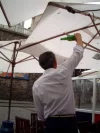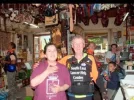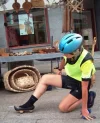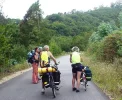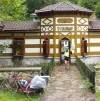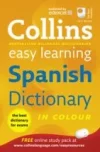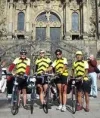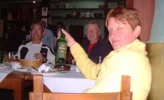picosrider
Active Member
There is no doubt that it is very useful, if not essential, to speak at least a bit of Spanish when undertaking the Camino. However it does take time to learn a foreign language and most of us are short of time. However it is not too difficult, or time consuming, to learn just enough to get by.
I have a friend who over 50 years has cycled in many countries of the world and has done that, learned just enough of various languages to get by. These include Spanish, French, German, Polish and even Japanese!
From experience he has learned that you can get by with about 150 phrases. He starts with a phrase book which includes phonetic pronounciations. He recommends the combined phrase book/dictionary by Berlitz, but there are others. From this he writes up the 150 most useful phrases onto flash cards, and then starts to learn and practise them. This way you only have to learn a minimum of words/phrases, those which are most likely to be of use during your trip.
There are some phrases which will not appear in your phrase book, for example:
Please can you stamp my credencial - Por favor, puede usted sellar mi credencial.
And instead of asking if there are rooms free, at a hostal you will be asking for a vacant bunk bed.
But you get the idea, it just needs a bit of thought and adaption!
So perhaps it would be useful to set up a pilgrims crash course of 150 useful phrases. So to start the ball rolling, any suggestions for inclusion is what should go into the top 20 most useful phrases? Are there any phrases that you want to know, or wish that you had known?
I have a friend who over 50 years has cycled in many countries of the world and has done that, learned just enough of various languages to get by. These include Spanish, French, German, Polish and even Japanese!
From experience he has learned that you can get by with about 150 phrases. He starts with a phrase book which includes phonetic pronounciations. He recommends the combined phrase book/dictionary by Berlitz, but there are others. From this he writes up the 150 most useful phrases onto flash cards, and then starts to learn and practise them. This way you only have to learn a minimum of words/phrases, those which are most likely to be of use during your trip.
There are some phrases which will not appear in your phrase book, for example:
Please can you stamp my credencial - Por favor, puede usted sellar mi credencial.
And instead of asking if there are rooms free, at a hostal you will be asking for a vacant bunk bed.
But you get the idea, it just needs a bit of thought and adaption!
So perhaps it would be useful to set up a pilgrims crash course of 150 useful phrases. So to start the ball rolling, any suggestions for inclusion is what should go into the top 20 most useful phrases? Are there any phrases that you want to know, or wish that you had known?












